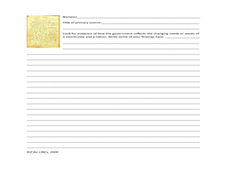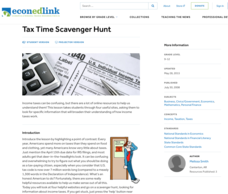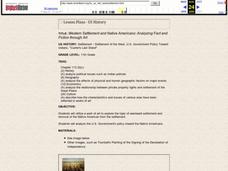Curated OER
Towards Separation of Church and State in Gloucester
Explore New England government in the 1700's with your class. They will identify historical documents as primary or secondary sources, then read and discuss the significance of these documents as they relate to the "freedom of religion"...
Judicial Learning Center
Your 4th Amendment Rights
Americans love to learn about their rights, especially those that protect them from the government's power to invade their privacy. Young people are especially engaged by this topic. An informative lesson explores four Supreme Court...
Curated OER
History Biographies
Students explore the life and the contributions of five people from U.S. history in the five lessons of this unit. james Madison, Dolly Madison, Sequoyah, Harriet Tubman, and Clara Barton are presented to students for exploration and...
Curated OER
Constitution
Ninth graders simulate a U.S. Supreme Court hearing concerning a First Amendment case about school prayer by participating in a hearing.
Curated OER
A House Dividing: The Growing Crisis of Sectionalism in Antebellum America
Learners explore the debates over American slavery and the power of the American federal government for the first half of the 19th century and how the regional economies and political events produced a widening split between the states.
iCivics
For The President, All In A Day's Work
How does the president of the United States get the authority to exercise his/her duties? What responsibilities and tasks go into a hard day's work for the president? Here is a lesson plan that includes several instructional materials...
Council for Economic Education
Tax Time Scavenger Hunt
Is a 1040EZ tax form really easy? Scholars investigate the complexities of the United States taxation system with an economics lesson plan. Using a wide variety of web sources, they interpret IRS taxation rules and regulations to better...
Curated OER
Writing Exercises: The French Revolution
The French Revolution is the topic for today's worksheet. Young historical analysts write a response to five critical thinking questions. They compare and contrast, define effects, describe the Old Regime, and analyze French...
State Bar of Texas
White v. Regester
One vote doesn't really matter, right? Class members investigate the concept of voter rights and restrictions using the 1973 Supreme Court case White v. Regester. They view a short video and work in pairs to analyze how people create...
Reed Novel Studies
The River: Novel Study
Some experiences are worth living again. At least, that is how government researchers feel about Brian's survival experience in the woods. The River is a sequel to Brian's adventures in Hatchet. Scholars read about the troubles...
Curated OER
Western Settlement and Native Americans: Analyzing Fact and Fiction through Art
Eleventh graders utilize a work of art to explore the topic of westward settlement and removal of the Native American from the settlement. They analyze the U.S. Government's policy toward the Native Americans.
Curated OER
Government and Community Resources
Adult learners, with the assistance of flash/picture cards, explore a variety of United States holidays and social customs: Labor Day, Halloween, Thanksgiving, Hanukkah, Christmas, and more. In addition, they draw pictures illustrating...
Curated OER
Cartoons for the Classroom: Government Motors
In this current events activity, students analyze a political cartoon about the General Motors bailout and respond to 3 talking point questions.
Curated OER
Ist's Yours- It's Mine
Young scholars investigate the concept of having an income as part of an economic system. They use the circular flow model to describe monetary policies. Students explain how policies of government influence the redistribution of income...
Curated OER
BRAC 2005
Students examine the role and purpose of the BRAC commission and identify ways for stakeholders to impact the BRAC process,an example of defense policy making.
Curated OER
We the People: 270 out of 538
Students engage in a lesson that helps them better explain the quadrennial ritual surrounding the election of a president in the United States of America.
Curated OER
Imposing Democracy
Twelfth graders discuss the probability of imposing a democracy in a country in which there is no history of this type of government being successful. Using the internet, they work together to research Japan's experience with democracy...
Curated OER
United States & Canada: How Are We The Same? How Are We Different?
Students compare and contrast similarities and differences between Canada and the US. For this geography lesson, students read various articles and identify similarities and differences in economies, cultures, geography, climate,...
Curated OER
Census Countdown
Students read and discuss the census and how the census is used by the government. In this census lesson plan, students use the data collected to compare different census's and their outcomes.
Curated OER
American Indian Tribal Sovereignty
Seventh graders examine the relationship among the governments of the sovereign American Indian Nations in Utah, the State of Utah, and the U.S. They list the objectives of the Office of Indian Affairs and examine their purpose.
Curated OER
Citizen Me
Fifth graders examine what it means to be a citizen. Using the Constitution, they discover the functions and purpose of government. They compare and contrast the difference between a democracy and a monarchy. As a class, they discuss...
Curated OER
Leaders in the Legislative Branch
Students read case studies about the leaders in the legislative branch of government. After reading the studies, they discover how the leaders have compromised on issues to best serve their states. They answer discussion questions and...
Curated OER
The 1932 Election: A Turning Point in History
Students discuss the presidential election in 1932. In this U.S. history lesson, students compare and contrast the differences between the Hoover administration and the administration of FDR. Students work in groups and present the...
Curated OER
Your Role as a Taxpayer: Why Pay Taxes?
Students evaluate the basic rationale, nature, and consequences fo taxes. They describe why governments need taxes as revenue to provide goods and servicesin this series of activities.
Other popular searches
- U.s. Government Flow Chart
- Ancient Rome u.s. Government
- Ap u.s. Government
- Branches of u.s. Government
- U.s. Government Lesson Plans
- U.s. Government (Branches)
- Cuba and u.s. Government
- U.s. Government Policies
- Early u.s. Government
- U.s. Government History
- Government u.s. Constitution
- Ap u.s. Government Media

























